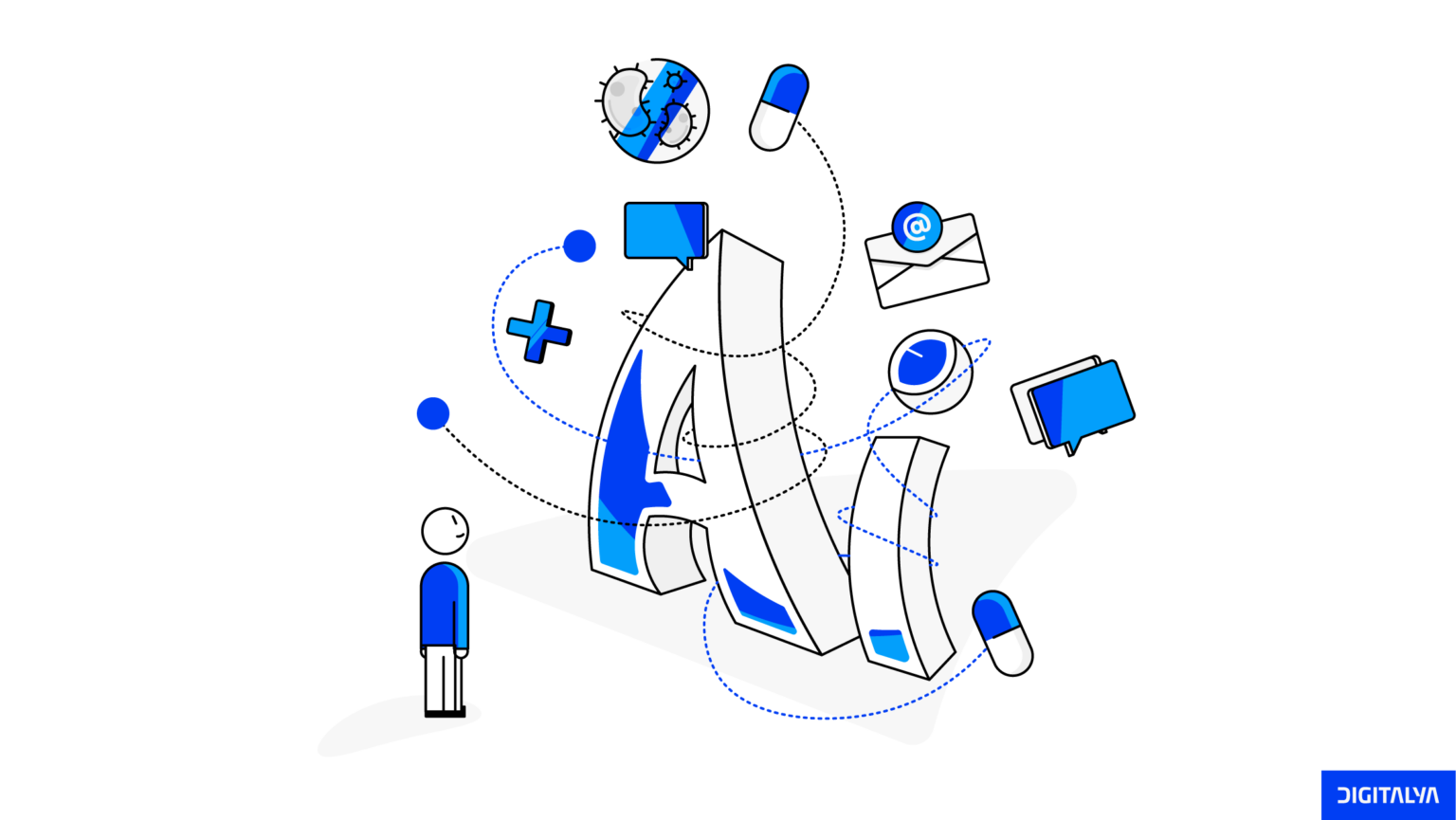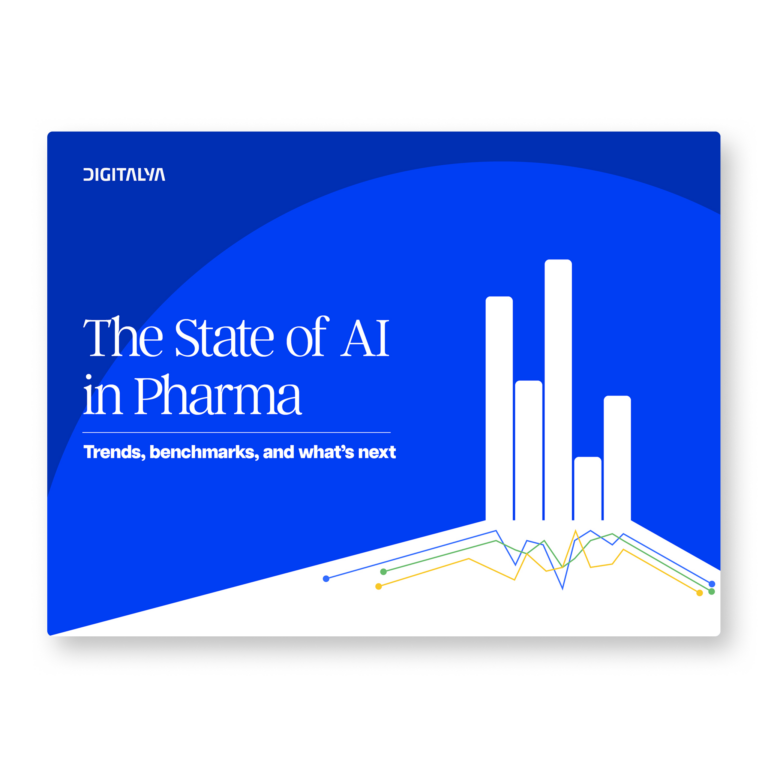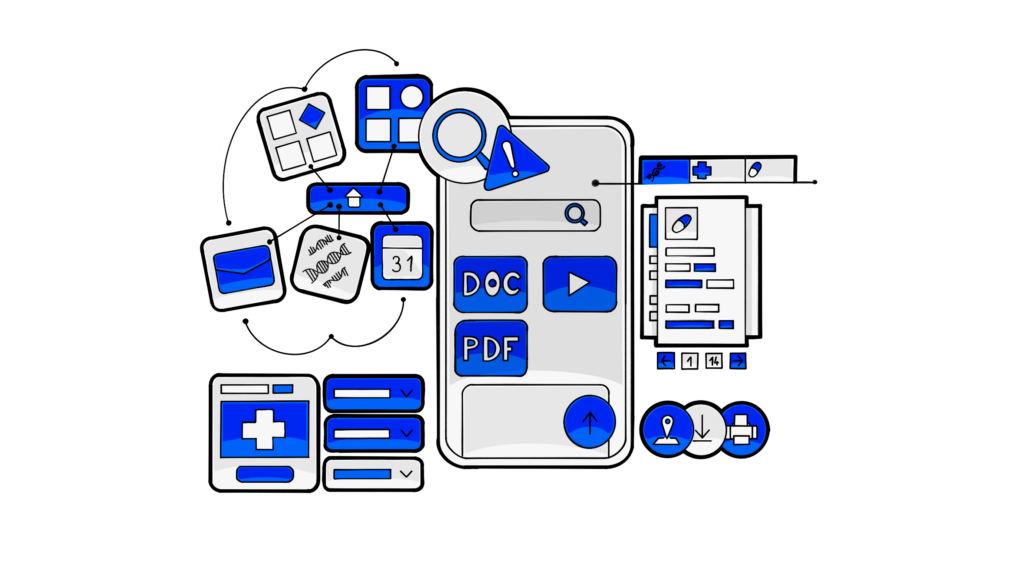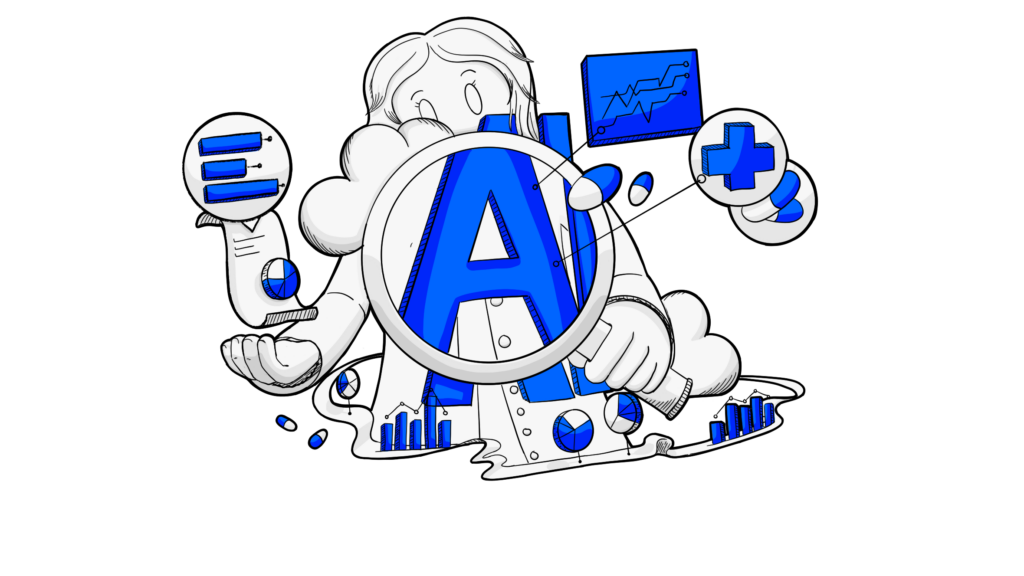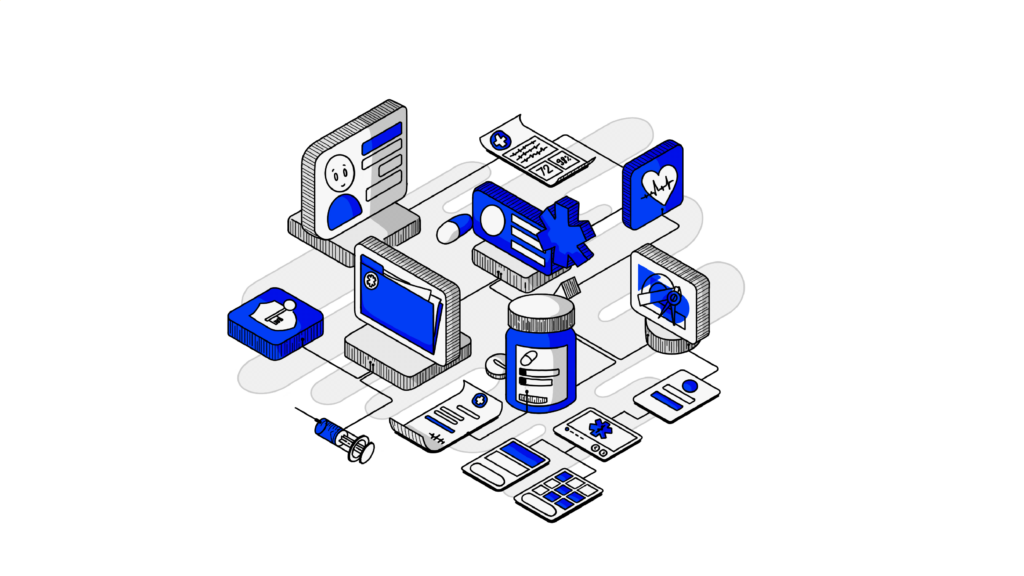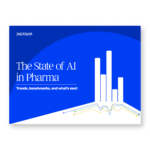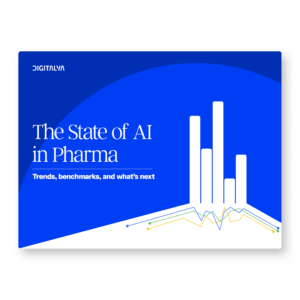1. How GenAI Chatbots address HCP’s specific needs
GenAI chatbots have emerged as transformative tools in healthcare, particularly in improving the functionality and usability of HCP portals. These intelligent systems leverage advanced AI models to provide personalized, accurate, and efficient support tailored to HCPs’ unique needs.
|
Key feature |
How GenAI helps |
Example |
Benefit |
|---|---|---|---|
| Quick access to reliable medical information |
GenAI chatbots provide instant, evidence-based answers to medical queries by analyzing vast databases of clinical guidelines, drug information, and research papers in real time. |
An HCP can ask, “What are the latest treatment protocols for Type 2 diabetes?” and receive a concise, up-to-date summary. |
Reduces time spent searching for information and ensures accuracy. |
| Personalized and relevant interactions |
By understanding user profiles, specialties, and preferences, chatbots can deliver content and recommendations tailored to individual HCPs. |
A chatbot could proactively notify a cardiologist about new heart failure drug trials while filtering out irrelevant oncology updates. |
Enhances engagement and streamlines information delivery. |
| Time efficiency in workflow |
Chatbots automate repetitive tasks, such as retrieving drug interaction data, booking training sessions, or compiling patient education materials. |
“Can you generate a printable guide on asthma management for my patient?” The chatbot generates a professional resource in seconds. |
Frees up HCPs’ time to focus on patient care. |
| Seamless navigation and usability |
Chatbots act as intuitive guides, helping HCPs navigate complex portals by responding to voice or text queries in natural language. |
Instead of manually searching through multiple tabs, an HCP could ask, “Where can I find clinical trial data for immunotherapy?” |
Eliminates frustration and simplifies portal use. |
| Real time proactive notifications |
Chatbots monitor updates in the healthcare landscape and alert HCPs to critical changes, such as new drug approvals, safety warnings, or regulatory guidelines. |
“You have a new alert: The FDA has approved a new anticoagulant for atrial fibrillation.” |
Keeps HCPs informed without requiring them to search for updates actively. |
| Continuous learning support |
Chatbots recommend relevant webinars, e-learning modules, or case studies based on an HCP’s field of interest and knowledge gaps. |
“Based on your recent searches, you might find this webinar on emerging treatments in oncology helpful.” |
Encourages ongoing professional development and knowledge retention. |
| Real time problem-solving |
Chatbots provide real time support for clinical decision-making, such as verifying drug dosages, reviewing contraindications, or suggesting alternative treatments. |
An HCP can ask, “Is Drug A safe to prescribe for a patient with kidney impairment?” and receive a tailored response based on guidelines. |
Improves patient outcomes through fast and informed decisions. |
GenAI chatbots are uniquely positioned to address the challenges faced by HCPs by delivering personalized, accurate, and real-time support. By enhancing efficiency, improving access to information, and fostering a seamless customer experience, these tools empower HCPs to focus on their core responsibility.

2. Benefits of implementing GenAI chatbots in HCP Portals
Integrating GenAI chatbots into HCP portals can significantly enhance their usability, efficiency, and overall value. By automating processes and reducing the time spent on routine tasks, GenAI chatbots can lead to significant cost savings. By addressing the specific needs of HCPs, these chatbots not only streamline workflows but also provide timely, personalized support that helps improve patient outcomes.
2.1 Enhanced user experience
GenAI chatbots, powered by conversational AI, considerably improve the overall customer experience for HCPs by offering intuitive, seamless, and highly personalized interactions within HCP portals. By reducing complexity and delivering value, chatbots ensure that HCPs can navigate and use portals efficiently without friction.
Key aspects
- Natural language interactions
GenAI chatbots enable HCPs to interact using everyday, conversational language. This eliminates the need to learn complicated portal interfaces, making the portals user-friendly, especially for time-pressed HCPs who need quick solutions.
For instance, instead of navigating menus, an HCP can ask, “Show me clinical trials for lung cancer patients under 40 years old.“ - Personalized support
The chatbots adapt to each user’s profile, specialty, and previous interactions to provide tailored content and assistance. By focusing only on what’s relevant to the HCPs, they save time and reduce information overload.
In particular, dermatologists will receive updates related to skin conditions, while neurologists will receive alerts about advancements in multiple sclerosis. - Seamless navigation
Chatbots act as intelligent guides, helping HCPs quickly locate resources, tools, or sections within the portal through conversational prompts. This way, frustration is reduced, and access to essential information is sped up.
To illustrate, HCPs can ask, “Where can I find the new safety updates for Drug X?” and they will be directed to the exact page. - 24/7 availability
Unlike human support, chatbots are available 24/7 to answer questions, resolve issues, and provide updates. This ensures uninterrupted access to support, regardless of the time or location.
- Quick response time
Chatbots process questions instantly and provide actionable, accurate answers. This reduces waiting times, enabling HCPs to access clinical information without delays.
- Reduction in cognitive load
Chatbots reduce the mental effort required to complete tasks by simplifying search processes, summarizing complex information, and organizing data clearly. This enables HCPs to focus more on patient care and less on navigating systems.
For example, a generative AI chatbot can provide a concise summary of drug interactions instead of displaying lengthy documents.
2.2 Improved knowledge management with generative AI chatbots
Generative AI chatbots, powered by large language models, play a critical role in enhancing knowledge management within HCP portals by streamlining access to reliable, up-to-date information and promoting continuous learning. These intelligent tools enable HCPs to efficiently discover, organize, and retain medical knowledge, ensuring they remain informed and empowered to make evidence-based decisions.
Key aspects
- Centralized access to information
Chatbots integrate with multiple data sources, including clinical guidelines, drug databases, scientific literature, and regulatory updates, providing a single point of access for HCPs. This reduces time spent searching across multiple platforms and ensures consistency in the information retrieved.
For instance, a question like “What are the latest NCCN guidelines for breast cancer treatment?” provides a summary and links to detailed resources. - Personalized knowledge recommendations
Using AI-driven insights, chatbots recommend relevant research papers, webinars, case studies, or e-learning modules based on an HCP’s specialty, search history, and preferences. This promotes continuous learning and ensures HCPs stay updated in their areas of interest.
- Contextual summarization of complex data
Generative AI chatbots can summarize lengthy clinical studies, guidelines, or reports into digestible insights tailored to an HCP’s specific needs. This saves time and reduces cognitive load when reviewing large volumes of information.
To illustrate, the prompt “Summarize this study on immunotherapy for lung cancer” will generate a concise overview with key findings. - Continuous improvement through AI learning
Chatbots improve their responses over time by learning from HCP interactions, ensuring the delivery of increasingly accurate and relevant knowledge. This ensures that knowledge management systems stay aligned with evolving medical practices.
This means that, over time, the chatbot recognizes recurring queries and prioritizes delivering concise, validated answers.
2.3 Accelerated decision-making
Generative AI empowers HCPs to make faster, evidence-based decisions by providing instant access to accurate, relevant, and actionable insights. GenAI chatbots enable self-service capabilities, allowing HCPs to access the information they need for decision-making quickly. By reducing time spent searching for data, summarizing findings, and validating choices, chatbots streamline clinical workflows and support HCPs in delivering timely care.
Key aspects
- Instant access to evidence-based information
GenAI chatbots retrieve clinical guidelines, drug interactions, and treatment protocols in real time. This eliminates delays caused by manual searches, ensuring HCPs can act quickly.
- Immediate access to safety alerts and updates
Chatbots deliver up-to-date safety alerts, drug recalls, or new clinical guidelines, ensuring HCPs have the latest data. This reduces delays caused by outdated or incomplete information.
- Proactive notifications for decision triggers
Chatbots identify decision triggers based on real-time input and alert HCPs to act promptly. This prevents delays in clinical decision points and enhances patient safety.
2.4 Personalized content delivery
Generative AI chatbots enhance HCP portals by delivering highly personalized content tailored to HCPs’ unique needs, preferences, and specialties. By leveraging user data, behavior patterns, and AI-driven insights, chatbots ensure that HCPs access only the most relevant information, enabling them to save time, stay informed, and make better decisions.
Key aspects
- Specialty-specific information
Chatbots analyze an HCP’s role, specialty, and practice area to curate content specific to their focus. This reduces information overload and ensures HCPs receive the most pertinent updates.
For instance, a cardiologist will receive the latest research on hypertension treatments, while an oncologist will get content related to targeted therapies for breast cancer. - Customized resource recommendations
Chatbots suggest articles, clinical studies, case reports, or webinars based on the HCP’s past searches, interests, and interactions. This encourages continuous learning and keeps HCPs updated without manual searching.
- Dynamic content updates
Chatbots deliver real-time updates tailored to individual preferences, such as new clinical guidelines, drug approvals, or safety alerts. This ensures HCPs stay current with the most relevant developments in their field.
- Behavior-based content curation
By tracking usage patterns, queries, and click behavior, chatbots can refine content delivery to align with HCP preferences. This provides increasingly accurate and relevant content over time.
To illustrate, if an HCP regularly searches for “diabetes management,” the chatbot prioritizes related clinical studies and updates.
2.5 Cost reduction and cost savings
Generative AI can significantly reduce operational costs by automating repetitive tasks, streamlining workflows, and optimizing resource utilization. Integrating GenAI chatbots can also optimize contact center operations by automating routine inquiries and reducing the need for large human support teams. By handling routine inquiries, providing instant access to information, and improving the efficiency of content delivery, chatbots allow pharma companies to achieve more with fewer resources.
Key aspects
- Reduced support team workload
Chatbots handle routine inquiries such as drug information, treatment guidelines, or account support, reducing the need for large human support teams. This minimizes labor costs while managing 24/7 availability.
- Optimize content delivery costs
Chatbots personalize and prioritize content delivery, ensuring that only relevant materials are shared with HCPs. This reduces costs associated with producing, distributing, and updating unnecessary or underutilized content.
For example, instead of sending mass updates to all users, the chatbot delivers targeted information aligned with specific specialties. - Scalable support at a lower cost
Unlike human teams, which scale linearly with demand, chatbots can simultaneously assist thousands of HCPs without additional costs. This enables cost-effective scalability during product launches, conferences, or peak usage periods.
To illustrate, during a major drug launch, the chatbot can answer FAQs for thousands of HCPs instantly, avoiding the need to hire additional support staff. - Minimized errors and associated costs
Chatbots provide accurate, consistent responses based on validated data, reducing human errors in information delivery or decision support. This means avoiding mistakes that could arise from incorrect or inconsistent answers.
For example, a chatbot ensures HCPs receive the correct dosage recommendations every time, reducing the risks of misinformation. - Efficient resource allocation
By automating routine tasks, human resources can focus on more strategic, value-driven activities, such as relationship-building and advanced problem-solving. This optimizes workforce allocation and reduces costs tied to low-impact tasks.

3. Use cases — how GenAI chatbots transform HCP Portal
Let’s discuss three use cases showcasing how these chatbots address HCP needs, streamline workflows, and enhance overall portal value.
GenAI chatbots, acting as virtual assistants, transform HCP portals by addressing specific needs and streamlining workflows.
3.1 Drug information access and updates with self service capabilities
Generative AI chatbots improve drug information management within HCP portals by providing instant, accurate, and up-to-date data. These chatbots enhance self-service capabilities by providing instant access to comprehensive drug profiles and safety updates. This ensures that HCPs can make confident, evidence-based decisions when prescribing treatments, managing adverse effects, or exploring drug interactions.
|
Key feature |
How it works |
Impact |
Example |
|---|---|---|---|
|
Instant retrieval of drug details |
Chatbots provide real-time access to comprehensive drug profiles, including indications, contraindications, side effects, and mechanisms of action. |
Reduces the time HCPs spend searching through databases, manuals, or outdated PDFs. |
HCP: “What are the contraindications for drug X?“ Chatbot: “Drug X is contraindicated in patients with severe renal impairment and hypersensitivity to its active ingredient.“ |
|
Real time safety updates and alerts |
Chatbots deliver critical drug safety information, such as FDA warnings, recalls, or newly reported adverse events, directly to HCPs. |
Ensures HCPs remain informed about risks that could impact patient safety. |
“Drug X now carries an updated warning for hepatotoxicity risk in patients with liver disease.“ |
|
Drug interaction checker |
Chatbots analyze potential drug-drug interactions based on an HCP’s query, cross-referencing validated clinical databases. |
Supports safer prescribing practices and minimizes the risk of adverse events. |
HCP: “Does Drug X interact with anticoagulants?“ Chatbot: “Yes, Drug X may increase the risk of bleeding when combined with anticoagulants. Monitor closely.“ |
|
New drug approvals and launch information |
Chatbots notify HCPs about newly approved drugs, their indications, clinical trial results, and therapeutic advantages. |
Keeps HCPs updated on emerging treatment options, enhancing their ability to offer innovative care. |
“the FDA has approved Drug X for the treatment of metastatic breast cancer. Would you like to see the clinical trial results?“ |
|
Dosage and administration guidance |
Chatbots provide precise dosing guidelines based on patient profiles. |
Reduces the risk of dosing errors and ensures compliance with clinical recommendations. |
HCP: “What is the pediatric dosage for Drug X?“ Chatbot: “For children aged 6-12 years, the recommended dose is 10mg/kg per day, divided into two doses.“ |
|
Drug availability and formulations |
Chatbots deliver details on drug availability, formulations, and dosage strengths. |
Enables HCPs to identify the best form of treatment for their patients quickly. |
HCP: “Is Drug B available as an injectable?“ Chatbot: “Yes, Drug B is available in IV form at a concentration of 50mg/mL.“ |
|
Access to clinical trial data |
Chatbots provide summaries of clinical trial outcomes, efficacy data, and real-world evidence for specific drugs. |
Helps HCPs evaluate drug effectiveness and make informed treatment decisions. |
“Drug X showed a 25% improvement in progression-free survival in the latest Phase 3 study for ovarian cancer.“ |
|
Region-specific drug information |
Chatbots offer localized drug approvals, pricing, and guidelines, ensuring compliance with regional regulations. |
Supports global HCPs in accessing region-specific drug information. |
“In the EU, Drug X is approved as a second-line therapy for rheumatoid arthritis.“ |
3.2 Personalized educational content for continuous learning using generative AI
Personalized educational content delivered by GenAI chatbots can significantly enhance customer satisfaction by meeting the unique needs and interests of HCPs. By analyzing user behavior, preferences, and specialties, these chatbots provide personalized learning experiences that empower HCPs to stay updated with the latest medical knowledge and advancements.
|
Key feature |
How it works |
Impact |
Example |
|---|---|---|---|
|
Customized learning recommendations |
Chatbots analyze HCP profiles, specialties, and previous interactions to recommend relevant educational materials, such as research articles, webinars, and video tutorials. |
Ensures HCPs receive content tailored to their needs, improving learning efficiency. |
HCP: “What’s new in cardiology for managing heart failure?“ Chatbot: “Here’s a summary of the latest clinical guidelines and a webinar on heart failure management advancements.“ |
|
Adaptive learning paths |
Chatbots create dynamic learning paths that adapt based on an HCP’s progress, knowledge level, and feedback. |
Encourages continuous learning at a personalized pace, enhancing knowledge retention. |
“You’ve completed the beginner module on diabetes management. Would you like to start the advanced module?“ |
|
Topic-specific content alerts |
Chatbots send alerts about new publications, research breakthroughs, and updated guidelines in specific areas of interest. |
Keeps HCPs informed about advancements without overwhelming them with irrelevant information. |
“A new clinical trial on immunotherapy for lung cancer was just published. Would you like a summary?“ |
|
Real-time knowledge updates |
Chatbots ensure HCPs receive real-time updates whenever guidelines, research findings, or protocols change. |
Keeps HCPs at the forefront of evidence-based practice. |
“The guidelines for managing atrial fibrillation were updated yesterday. Here’s a quick summary of the key changes. |
4. Conclusion
The integration of GenAI chatbots into HCP portals marks a transformative step in enhancing HCP engagement and patient care. By addressing the limitations of traditional platforms, these advanced solutions deliver real-time access to critical information, streamline workflows, and provide personalized, data-driven support.
GenAI chatbots are tailored to meet the evolving needs of HCPs in today’s complex pharma landscape. They can improve user experience, accelerate decision-making, offer predictive insights, and automate compliance updates.
By embracing GenAI-powered solutions, pharmaceutical organizations empower healthcare professionals and contribute to better patient outcomes and a more efficient healthcare ecosystem. As this technology continues to evolve, it will undoubtedly play an indispensable role in driving innovation.
